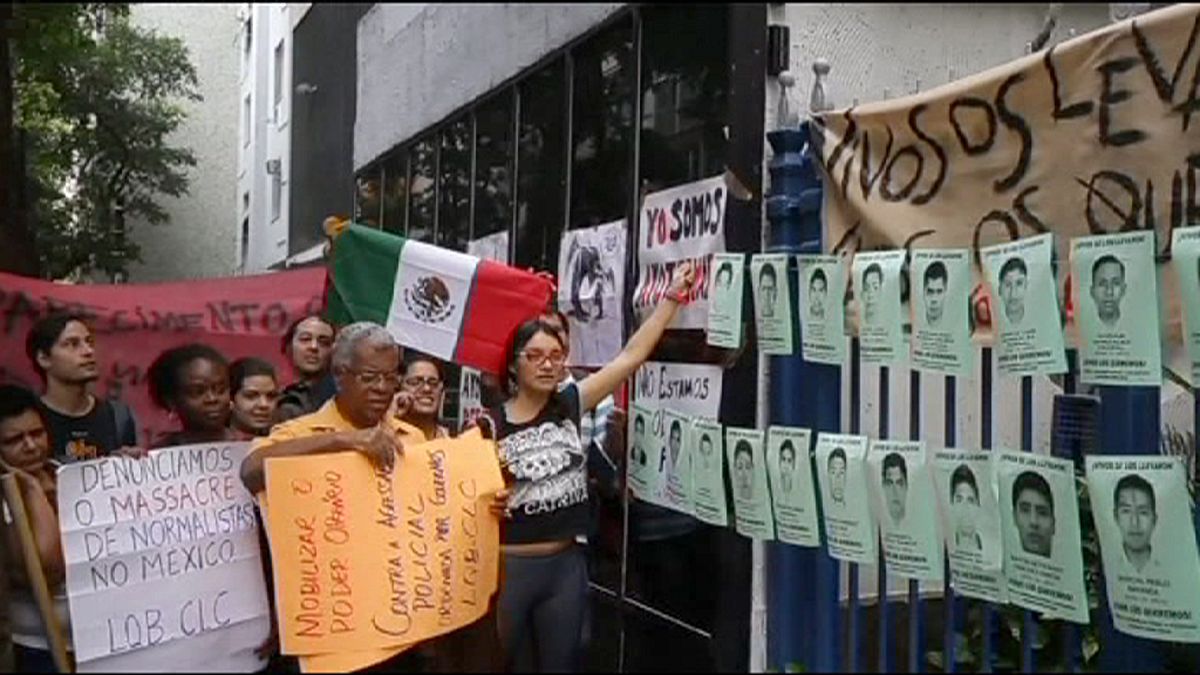Shouting, ‘government murderers, we want them back alive!’ protesters in Mexico City demanded action in relation to the disappearance on 26th September of 43 impoverished student teachers.
They were enrolled at a college in Ayotzinapa, in south-west Mexico. Returning from a demonstration in the city of Iguala, their buses were ambushed and fired on by municipal police.
Six were killed, 25 were wounded. Some got away. Forty-three were abducted and handed over to a crime group called the Guerreros Unidos, investigators said, whose task was to make them disappear.
Mexican Federal officials say the mayor of Iguala, José Luis Abarca, and his wife, ordered this.
There have been many arrests, charges of murder and gathering of evidence.
Mexico’s Attorney General Jesus Murillo Karam said: “The detainees themselves say the order was given by radio from the central police station, and they were told it came from ‘A5’, the code used to identify the mayor of Iguala.”
To search for the students, the capital dispatched 2,000 federal and military police. Statements from 56 detainees — which included public sector workers, police and drug traffickers — led to around one dozen hidden graves in the Guerrero Mountains, but there wasn’t a trace of the students.
Human rights activist and priest Alejandro Solalinde went on television on 20th October saying an anonymous source had told him they were all dead: “Another account that I’ve received is that some of the youngsters were wounded and some of them were already dead. They didn’t tell me how many, but they were burned and buried together. They talk about stacking up wood from a table, then pouring diesel on them.”
The outrage has spread beyond the country’s own borders, including a demonstration outside the Mexican Consulate in Rio de Janeiro, Brazil.
Writer Elena Poniatowska is at the centre of the fight to find Mexico’s missing students. We spoke to her in her home in the capital. She made a very moving speech in Mexico City’s Zócalo Square a few days ago on their behalf.
Poniatowska is a laureate of the most important Spanish language literature award, the Miguel de Cervantes Prize. She presented some of the key facts and context of what happened.
Elena Poniatowska: “These 43 youths are very poor. Their families have nothing. They’re mostly farming families. Photos I saw of their rooms in the teacher’s college they were going to showed how bare and poor their rooms were, their backpacks on the floor, no furniture, pieces of cardboard on the floor, no bunks, no beds, just completely abandoned. To attend their studies they have to go around begging with a tin, asking people to help them out with some money, give some loose change. These boys are very young, and full of aspirations, and so this is just terrible, because this is treating them as if they were rubbish, simply because they were poor.”
Poniatowska condemns the local authorities as corrupt, linking them to the students’ disappearance.
Family members accuse authorities at all levels of government of cooperating with organised crime.
Poniatowska: “They were taken away in buses, because according to the wife of the Mayor of Iguala, José Luis Abarca, a man who got rich while in power, like his wife — who had power she wasn’t entitled to but who really ruled Iguala and Ayotzinapa — according to her, the students were going to interrupt a party or a political meeting she had organised. And so they took them away in trucks, and since then we’ve had absolutely no news about them. This is truly a crime of the state, because some of the young people were able to get away from the police hunt or the hunt by groups, which I think are government groups from there, repression groups. Some of the young people who escaped by hiding in the trees have given testimony.”
Poniatowska has been committed to fighting for rule of law in Mexico almost her whole life. Her book The Night of Tlatelolco is well-known, on the 1968 massacre of students, the government suppressing political opposition.
Poniatowska: “This is a crime against humanity. It is not possible that the disappearance of 43 youths with their whole future ahead of them, their whole lives ahead of them, goes unpunished — that from one day to the next their parents looking for them have no word of them. But also for us Mexicans it is a disaster, an extraordinary loss, even for what our country stands for. This consigns our country to ruin.”
